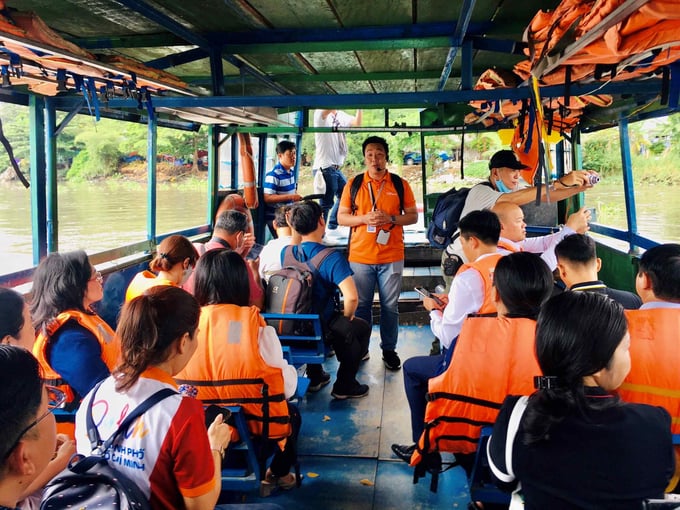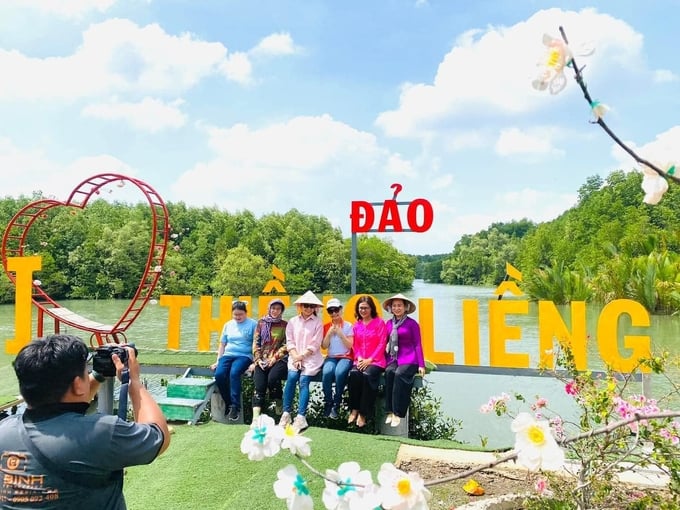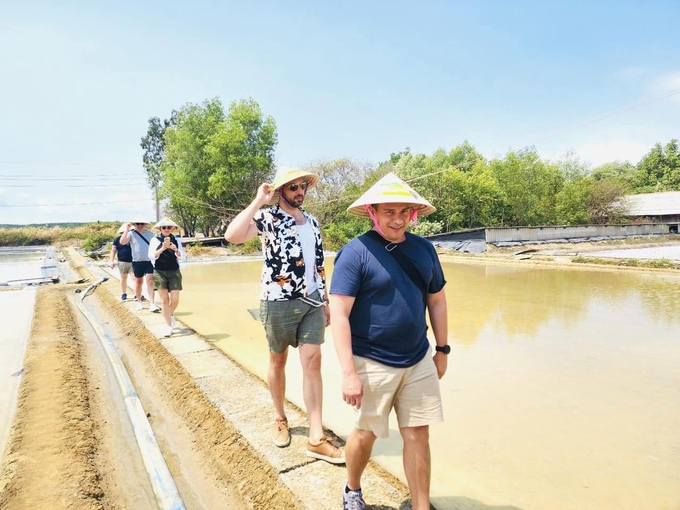June 16, 2025 | 02:20 GMT +7
June 16, 2025 | 02:20 GMT +7
Hotline: 0913.378.918
June 16, 2025 | 02:20 GMT +7
Hotline: 0913.378.918

According to a survey, at least 83% of tourists expressed a desire to contribute to making the destinations they visit greener and cleaner after their departure. Photo: SDL.
Green tourism is poised to become a crucial driving force for green economic development, sustainable growth, and Net Zero goal achievement by 2050.
Nguyen Van Hung, Minister of Culture, Sports, and Tourism of Vietnam, noted that the country is undergoing extensive international integration. Vietnam consistently demonstrates its responsibility and commitment to fulfilling international agreements, and complying with recommendations made by global tourism organizations, particularly the United Nations World Tourism Organization (UNWTO).
"UNWTO has emphasized that green tourism must be developed in close association with environmental protection and respect, in addition to sustaining local livelihoods. At a higher level, Net Zero tourism aims to minimize and eliminate carbon emissions and other negative impacts on tourism activities," Minister Nguyen Van Hung commented.
He further explained that the government has called for the creation of a program in correspondence with Vietnam’s people, culture, and national identity. Accordingly, the government has issued Resolution No. 82, which outlines the national growth plan for the years between 2021 and 2030, prioritizing tourism development with a focus on green growth and creating green tourism products.
Notably, Vietnam will focus on developing tourism in association with technological innovation, the use of renewable energy sources, and the reduction of greenhouse gas emissions to create unique and attractive green products for tourists. This approach also involves enhancing destination management by eliminating plastic waste and improving the effectiveness of tourism development policies, particularly through digital transformation.
Moreover, the diversification of tourism development should focus on expanding potential product lines that utilize Vietnam's natural strengths, such as green tourism, agricultural tourism, and the exploration of natural and cultural heritage experiences.
The tourism industry also has the responsibility to create employment opportunities, share benefits within local communities, and preserve the nation's traditional cultural values.

Thieng Lieng Islet in Thanh An Commune, Can Gio District, Ho Chi Minh City, has become a popular destination for both domestic and international tourists seeking unique experiences and exploration. Photo: T.L.
Dr. Luong Quang Huy, Head of Greenhouse Gas Emission Reduction and Ozone Layer Protection at the Department of Climate Change under the Ministry of Natural Resources and Environment, emphasized that all nations and political systems around the world must take responsibility for global climate change and uphold their national commitments.
Vietnamese tourism companies and government agencies are currently implementing various measures to reduce emissions and greenhouse gases from tourism-related activities.
"The tourism industry plays a crucial role in guiding and managing stakeholders to the achieve aforementioned goals," emphasized Dr. Huy.
As one of the regions with a large number of domestic and international visitors, Nguyen Van Dung, Vice Chairman of the Ho Chi Minh City People's Committee, reported that the city has made substantial efforts to collaborate with provinces and cities within the region, as well as coordinate with various international organizations, to develop sustainable programs and increase community awareness. Notably, the city receives a large number of visitors, both domestically and internationally, every year.
More importantly, Ho Chi Minh City, a major tourist destination and a pioneer in regional collaboration, must advocate for further breakthroughs as other nations within the region race towards their Net Zero targets.

American tourists experiencing agricultural tourism on Thieng Lieng Islet. Photo: T.L.
According to Truong Minh Huy Vu, Director of the Ho Chi Minh City Institute for Development Studies, promoting green transformation and sustainable tourism requires collective action and a roadmap with medium- and long-term goals. Furthermore, these plans must be adjusted accordingly in order to facilitate a gradual transition and minimize economic and social impacts.
The transition roadmap may require 10 to 20 years to provide space for stakeholders to engage in dialogue, experimentation, learning, debate, and policy adjustments.
Departments, agencies, business associations, local communities, and international partners must contribute and participate in developing detailed solutions for the immediate future. This includes formulating action plans, allocating resources, assessing impacts, and outlining implementation roadmaps.
As an exemplary model of green tourism, the National Park Passport initiative is a bridge that connects responsibilities and benefits among stakeholders. In addition to exploring forest values, visitors are encouraged to "experience" competition, share personal stories, and promote these interactions within the community.
Initially implemented across 34 national parks, the National Park Passport can be obtained in either physical or electronic formats. Visitors can stamp their paper passports upon entry or via an application at each new national park. Personal impressions and evaluations are also recorded within the passport system.
The National Park Passport initiative has been implemented across many countries around the world, with the goal of enhancing environmental awareness, promoting cultural education, boosting tourism activities, and generating sustainable income for designated forest areas.
Translated by Nguyen Hai Long
![Turning wind and rain into action: [4] Bringing climate bulletins to remote and isolated areas](https://t.ex-cdn.com/nongnghiepmoitruong.vn/608w/files/linhnhp/2025/06/14/1152-z6704423696987_15fd32ffc26d590d204d520c9dac6786-nongnghiep-151141.jpg)
(VAN) The Vietnam Agriculture and Nature Newspaper interviewed Mr. Vu Thai Truong, Acting Head of Climate Change and Environment at UNDP Vietnam, to gain deeper insight into how climate bulletins are delivered to farmers.

(VAN) In Tien Giang, a high-tech shrimp farm has developed a distinctive energy-saving farming model that has yielded promising results.
![Turning wind and rain into action: [3] 300.000 farmers benefit from agro-climatic bulletins](https://t.ex-cdn.com/nongnghiepmoitruong.vn/608w/files/news/2025/06/12/e5a48259d6a262fc3bb3-nongnghiep-125122.jpg)
(VAN) The agro-climatic bulletin has become a valuable tool for farmers in the Mekong Delta. After more than five years of implementation, the initiative is gradually being expanded nationwide.
![Turning wind and rain into action: [2] Providing forecasts to the people](https://t.ex-cdn.com/nongnghiepmoitruong.vn/608w/files/news/2025/06/12/e5a48259d6a262fc3bb3-nongnghiep-103927.jpg)
(VAN) In addition to improving the quality of hydrometeorological forecasts, putting forecast bulletins into practical use is crucial for production and disaster prevention.

(VAN) Blue carbon is receiving attention for its rapid absorption capacity and vast potential. It represents a promising nature-based solution to respond to climate change.
/2025/06/11/3507-1-161904_583.jpg)
(VAN) Seagrass beds and coral reefs serve as 'cradles' that nurture life in the ocean depths, creating rich aquatic resources in Vietnamese waters.
![Turning wind and rain into action: [1] Forecasting for farmers](https://t.ex-cdn.com/nongnghiepmoitruong.vn/608w/files/news/2025/06/11/e5a48259d6a262fc3bb3-nongnghiep-111919.jpg)
(VAN) Weather is no longer just a matter of fate. Forecasts have now become an essential companion for farmers in every crop season.